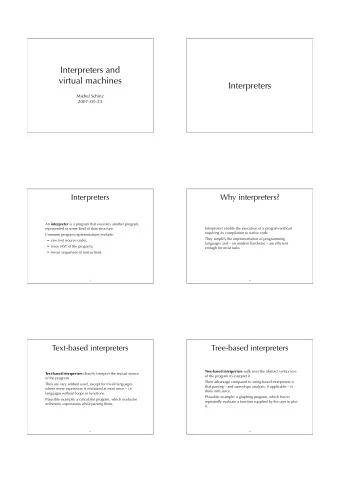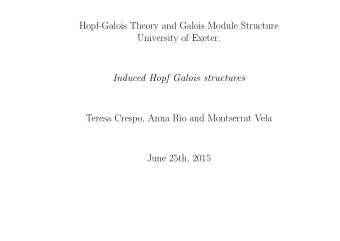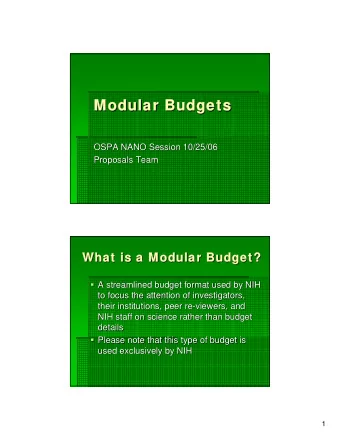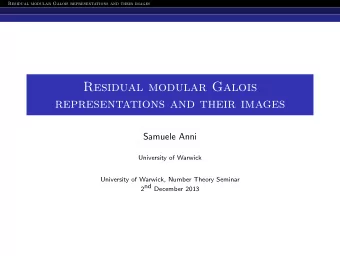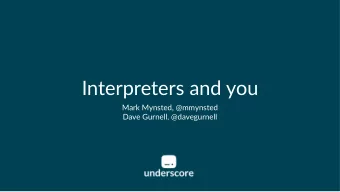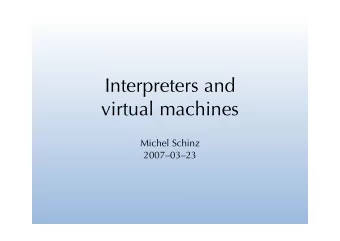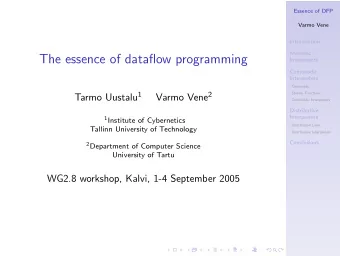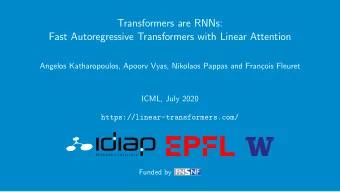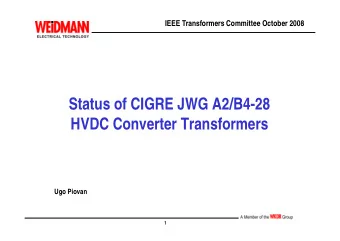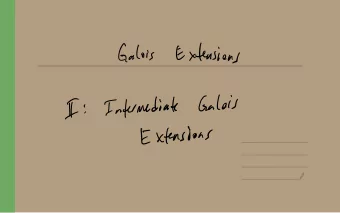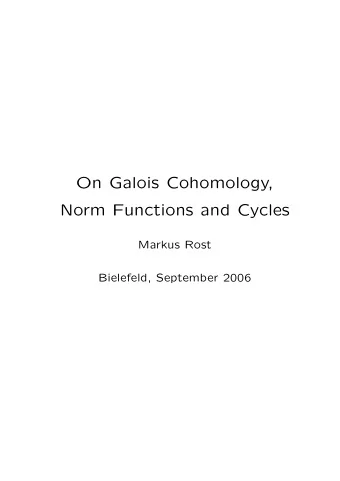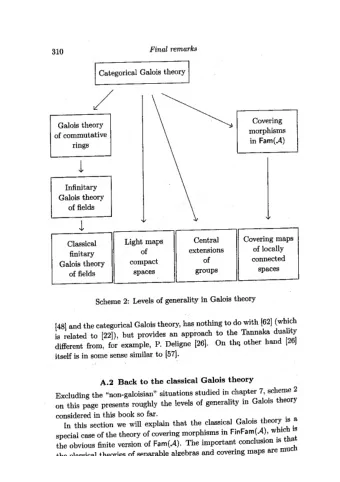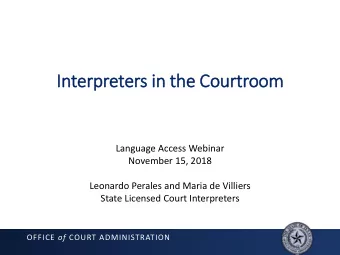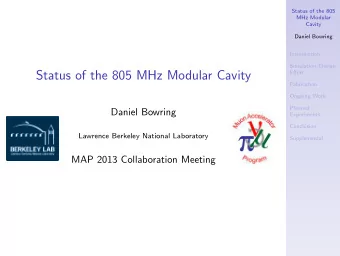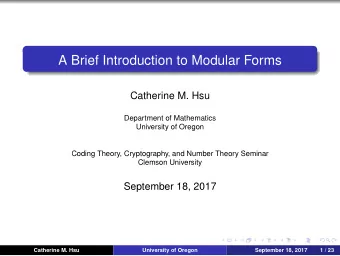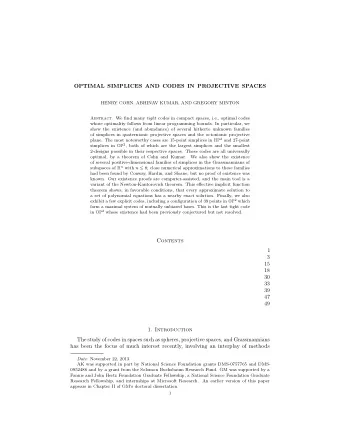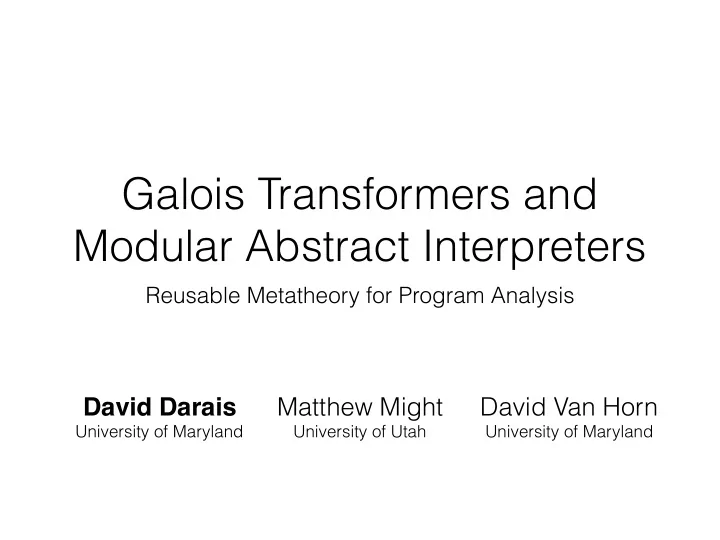
Galois Transformers and Modular Abstract Interpreters Reusable - PowerPoint PPT Presentation
Galois Transformers and Modular Abstract Interpreters Reusable Metatheory for Program Analysis David Darais Matthew Might David Van Horn University of Maryland University of Utah University of Maryland Program Analysis 2 Program
Galois Transformers and Modular Abstract Interpreters Reusable Metatheory for Program Analysis David Darais Matthew Might David Van Horn University of Maryland University of Utah University of Maryland
Program Analysis 2
Program Analysis • Lots of choices when designing a program analysis 2
Program Analysis • Lots of choices when designing a program analysis • Choices make tradeoffs between precision and performance 2
Program Analysis • Lots of choices when designing a program analysis • Choices make tradeoffs between precision and performance • Implementations are brittle and difficult to change 2
Program Analysis • Lots of choices when designing a program analysis • Choices make tradeoffs between precision and performance • Implementations are brittle and difficult to change • Galois Transformers : Reusable components for building program analyzers 2
Program Analysis • Lots of choices when designing a program analysis • Choices make tradeoffs between precision and performance • Implementations are brittle and difficult to change • Galois Transformers : Reusable components for building program analyzers • Bonus : Variations in path/flow sensitivity of your analyzer for free 2
Let's Design an Analysis (in the paradigm of abstract interpretation) 3
Let's Design an Analysis Program 0: int x y; // global state 1: void safe_fun(int N) { 2: if (N ≠ 0) {x := 0;} 3: else {x := 1;} 4: if (N ≠ 0) {y := 100/N;} 5: else {y := 100/x;}} 4
Let's Design an Analysis Program Analysis Property 0: int x y; // global state 1: void safe_fun(int N) { 2: if (N ≠ 0) {x := 0;} 3: else {x := 1;} 4: if (N ≠ 0) {y := 100/N;} 5: else {y := 100/x;}} x/0 5
Let's Design an Analysis Program Analysis Property Abstract Values 0: int x y; // global state 1: void safe_fun(int N) { x/0 2: if (N ≠ 0) {x := 0;} 3: else {x := 1;} 4: if (N ≠ 0) {y := 100/N;} 5: else {y := 100/x;}} ℤ ⊑ {-,0,+} 6
Let's Design an Analysis Program Analysis Property Abstract Values Implement 0: int x y; // global state 1: void safe_fun(int N) { x/0 ℤ ⊑ {-,0,+} 2: if (N ≠ 0) {x := 0;} 3: else {x := 1;} 4: if (N ≠ 0) {y := 100/N;} 5: else {y := 100/x;}} analyze : exp → results analyze(x := æ) := .. x .. æ .. analyze( IF( æ ){ e ₁ }{ e ₂ } ) := .. æ .. e ₁ .. e ₂ .. 7
Let's Design an Analysis Program Analysis Property Abstract Values Get Results 0: int x y; // global state 1: void safe_fun(int N) { x/0 ℤ ⊑ {-,0,+} 2: if (N ≠ 0) {x := 0;} 3: else {x := 1;} 4: if (N ≠ 0) {y := 100/N;} 5: else {y := 100/x;}} N ∈ {-,0,+} x ∈ {0,+} Implement y ∈ {-,0,+} analyze : exp → results analyze(x := æ) := UNSAFE : {100/N} .. x .. æ .. analyze( IF( æ ){ e ₁ }{ e ₂ } ) := UNSAFE : {100/x} .. æ .. e ₁ .. e ₂ .. 8
Let's Design an Analysis Program Analysis Property Abstract Values Prove Correct 0: int x y; // global state 1: void safe_fun(int N) { x/0 ℤ ⊑ {-,0,+} 2: if (N ≠ 0) {x := 0;} 3: else {x := 1;} 4: if (N ≠ 0) {y := 100/N;} 5: else {y := 100/x;}} ⟦ e ⟧ ∈ ⟦ analyze(e) ⟧ Implement Get Results analyze : exp → results N ∈ {-,0,+} analyze(x := æ) := x ∈ {0,+} .. x .. æ .. y ∈ {-,0,+} analyze( IF( æ ){ e ₁ }{ e ₂ } ) := .. æ .. e ₁ .. e ₂ .. UNSAFE : {100/N} UNSAFE : {100/x} 9
Let's Design an Analysis Program Analysis Property Abstract Values 0: int x y; // global state 1: void safe_fun(int N) { x/0 ℤ ⊑ {-,0,+} 2: if (N ≠ 0) {x := 0;} 3: else {x := 1;} 4: if (N ≠ 0) {y := 100/N;} 5: else {y := 100/x;}} Implement Get Results Prove Correct analyze : exp → results N ∈ {-,0,+} analyze(x := æ) := x ∈ {0,+} ⟦ e ⟧ ∈ ⟦ analyze(e) ⟧ .. x .. æ .. y ∈ {-,0,+} analyze( IF( æ ){ e ₁ }{ e ₂ } ) := .. æ .. e ₁ .. e ₂ .. UNSAFE : {100/N} UNSAFE : {100/x} 10
Let's Design an Analysis 0: int x y; // global state 1: void safe_fun(int N) { 2: if (N ≠ 0) {x := 0;} 3: else {x := 1;} 4: if (N ≠ 0) {y := 100/N;} Flow-insensitive 5: else {y := 100/x;}} results : var ↦ ! ({-,0,+}) N ∈ {-,0,+} x ∈ {0,+} y ∈ {-,0,+} UNSAFE : {100/N} UNSAFE : {100/x} 11
Let's Design an Analysis 0: int x y; // global state 1: void safe_fun(int N) { 2: if (N ≠ 0) {x := 0;} 3: else {x := 1;} 4: if (N ≠ 0) {y := 100/N;} Flow-sensitive 5: else {y := 100/x;}} results : loc ↦ (var ↦ ! ({-,0,+})) 12
Let's Design an Analysis 0: int x y; // global state 1: void safe_fun(int N) { 2: if (N ≠ 0) {x := 0;} 3: else {x := 1;} 4: if (N ≠ 0) {y := 100/N;} Flow-sensitive 5: else {y := 100/x;}} results : 4: x ∈ {0,+} loc ↦ (var ↦ ! ({-,0,+})) 4.T: N ∈ {-,+} 5.F: x ∈ {0,+} N,y ∈ {-,0,+} UNSAFE : {100/x} 13
Let's Design an Analysis 0: int x y; // global state 1: void safe_fun(int N) { 2: if (N ≠ 0) {x := 0;} 3: else {x := 1;} 4: if (N ≠ 0) {y := 100/N;} Path-sensitive 5: else {y := 100/x;}} results : loc ↦ ! (var ↦ ! ({-,0,+})) 14
Let's Design an Analysis 0: int x y; // global state 1: void safe_fun(int N) { 2: if (N ≠ 0) {x := 0;} 3: else {x := 1;} 4: if (N ≠ 0) {y := 100/N;} Path-sensitive 5: else {y := 100/x;}} results : 4: N ∈ {-,+},x ∈ {0} loc ↦ ! (var ↦ ! ({-,0,+})) 4: N ∈ {0},x ∈ {+} N ∈ {-,+},y ∈ {-,0,+} N ∈ {0},y ∈ {0,+} SAFE 15
Let's Design an Analysis Program Analysis Property Abstract Values 0: int x y; // global state 1: void safe_fun(int N) { x/0 ℤ ⊑ {-,0,+} 2: if (N ≠ 0) {x := 0;} 3: else {x := 1;} 4: if (N ≠ 0) {y := 100/N;} 5: else {y := 100/x;}} Implement Get Results Prove Correct ? 4: N ∈ {-,+},x ∈ {0} analyze : exp → results 4: N ∈ {0},x ∈ {+} analyze(x := æ) := ⟦ e ⟧ ∈ ⟦ analyze(e) ⟧ .. x .. æ .. N ∈ {-,+},y ∈ {-,0,+} analyze( IF( æ ){ e ₁ }{ e ₂ } ) := N ∈ {0},y ∈ {0,+} .. æ .. e ₁ .. e ₂ .. SAFE 16
Let's Design an Analysis Program Analysis Property Abstract Values ✓ 0: int x y; // global state 1: void safe_fun(int N) { x/0 ℤ ⊑ {-,0,+} 2: if (N ≠ 0) {x := 0;} 3: else {x := 1;} 4: if (N ≠ 0) {y := 100/N;} 5: else {y := 100/x;}} Implement Get Results Prove Correct ? ✗ ✗ 4: N ∈ {-,+},x ∈ {0} analyze : exp → results 4: N ∈ {0},x ∈ {+} analyze(x := æ) := ⟦ e ⟧ ∈ ⟦ analyze(e) ⟧ .. x .. æ .. N ∈ {-,+},y ∈ {-,0,+} analyze( IF( æ ){ e ₁ }{ e ₂ } ) := N ∈ {0},y ∈ {0,+} .. æ .. e ₁ .. e ₂ .. SAFE 16
Let's Design an Analysis Program Analysis Property Abstract Values ? x/0 safe_fun.js ℤ ⊑ {-,0,+} Implement Get Results Prove Correct 4: N ∈ {-,+},x ∈ {0} analyze : exp → results 4: N ∈ {0},x ∈ {+} analyze(x := æ) := ⟦ e ⟧ ∈ ⟦ analyze(e) ⟧ .. x .. æ .. N ∈ {-,+},y ∈ {-,0,+} analyze( IF( æ ){ e ₁ }{ e ₂ } ) := N ∈ {0},y ∈ {0,+} .. æ .. e ₁ .. e ₂ .. SAFE 17
Let's Design an Analysis Program Analysis Property Abstract Values ✓ ? x/0 safe_fun.js ℤ ⊑ {-,0,+} Implement Get Results Prove Correct ✗ ✗ 4: N ∈ {-,+},x ∈ {0} analyze : exp → results 4: N ∈ {0},x ∈ {+} analyze(x := æ) := ⟦ e ⟧ ∈ ⟦ analyze(e) ⟧ .. x .. æ .. N ∈ {-,+},y ∈ {-,0,+} analyze( IF( æ ){ e ₁ }{ e ₂ } ) := N ∈ {0},y ∈ {0,+} .. æ .. e ₁ .. e ₂ .. SAFE 17
Problems Worth Solving • How to change path/flow sensitivity without redesigning from scratch? • How to reuse machinery between analyzers for different languages? • How to translate proofs between different analysis designs? 18
Solution Monad Galoi ѕ Galois + = Transformers Transformer ѕ Connections Compositional Compositional Compositional abstract interpreters abstractions interpreters 19
Galoi ѕ Transformer ѕ • What's a Monad? • What are Transformers? • What are Galois Connections? 20
Galoi ѕ Transformer ѕ • What's a Monad? • What are Transformers? • What are Galois Connections? 21
A Monad • A module with: type " (t) • a type operator " op x ← e ₁ ; e ₂ • a semicolon operator op return(e) (bind) • effect operation op get op put(e) • " (t) : op fail • "A computation that performs op ... some effects, then returns t " 22
A Monadic Interpreter Program Analysis Property Abstract Domain 0: int x y; // global state 1: void safe_fun(int N) { x/0 ℤ ⊑ {-,0,+} 2: if (N ≠ 0) {x := 0;} 3: else {x := 1;} 4: if (N ≠ 0) {y := 100/N;} 5: else {y := 100/x;}} Implement Get Results Prove Correct analyze : exp → results N ∈ {-,0,+} analyze(x := æ) := x ∈ {0,+} ⟦ e ⟧ ∈ ⟦ analyze(e) ⟧ .. x .. æ .. y ∈ {-,0,+} analyze( IF( æ ){ e ₁ }{ e ₂ } ) := .. æ .. e ₁ .. e ₂ .. UNSAFE : {100/N} UNSAFE : {100/x} 23
A Monadic Interpreter 0: int x y; // global state 1: void safe_fun(int N) { 2: if (N ≠ 0) {x := 0;} 3: else {x := 1;} 4: if (N ≠ 0) {y := 100/N;} 5: else {y := 100/x;}} 24
Recommend
More recommend
Explore More Topics
Stay informed with curated content and fresh updates.
